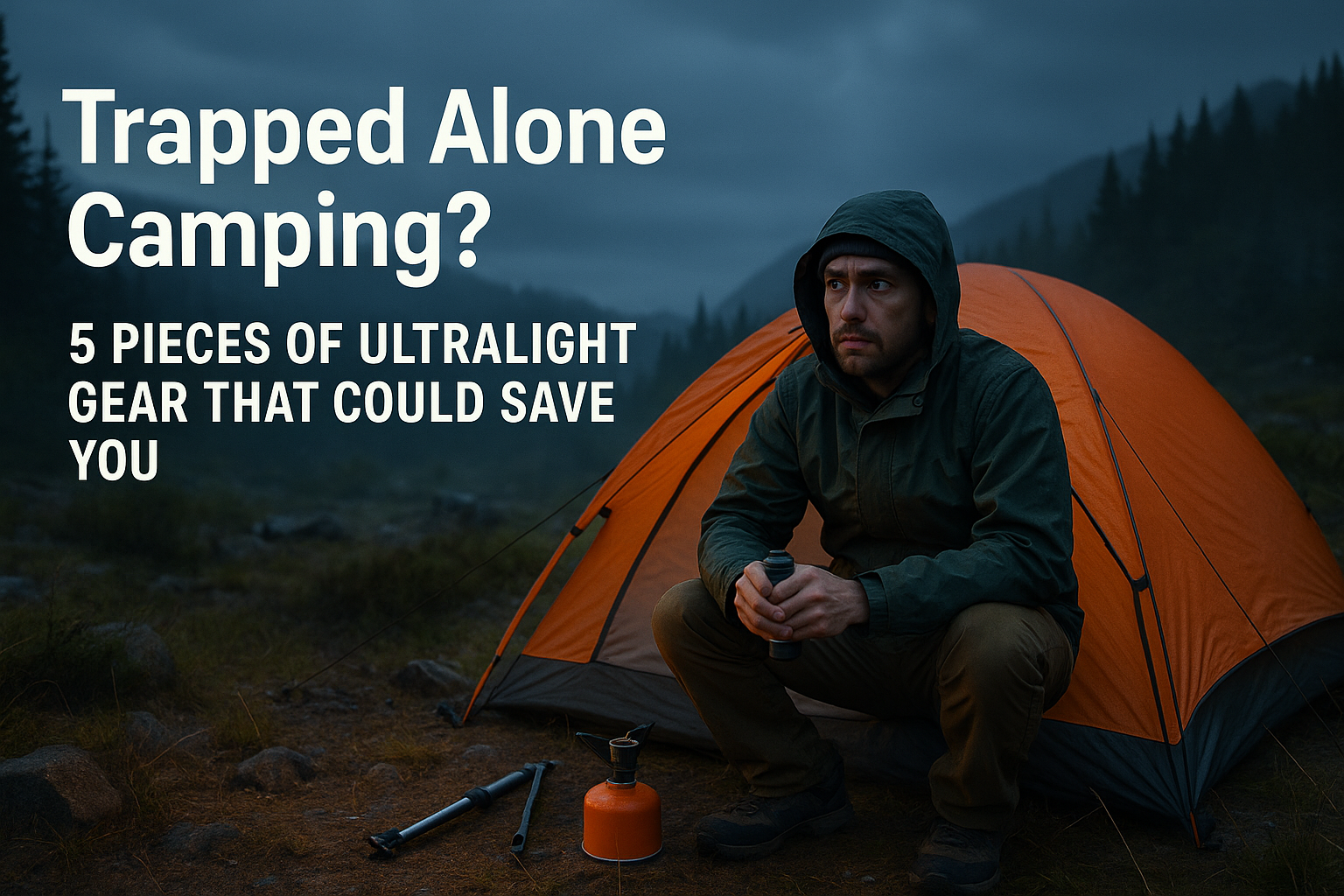You thought it would be a simple solo camp.
Maybe a quick overnight.
Then the unexpected happens:
- You slip and twist your ankle.
- A storm rolls in, cutting off trails.
- Your gear gets soaked or damaged.
- Your phone battery dies with no signal anyway.
Now you’re trapped — alone, tired, cold, and injured.
Your survival depends not on strength, but on what you packed.
Here are 5 non-obvious ultralight gear pieces that could quietly save your life if you’re trapped while solo camping.
🛡 Core Survival Principle: You Must Self-Rescue Before You Collapse
✅ You have no backup team.
✅ You have limited body energy once you’re injured, hypothermic, or dehydrated.
✅ Your gear must work injured, wet, cold, panicked, half-blind in darkness.
If your survival plan requires perfect conditions —
you already failed.
These 5 ultralight items aren’t luxury gear —
they are emergency extensions of your brain, body, and willpower.
🔥 1. SOL Escape Bivvy (Not a Cheap Mylar Bag)
Weight: ~5–6 oz
Lifesaving Role: Emergency heat trap + waterproof shelter
Why it’s different from basic space blankets:
- Breathable (won’t trap condensation and soak you like mylar)
- Windproof and waterproof shell
- Reflects ~70% of body heat inside
- Reinforced — won’t tear in heavy wind or sharp rocks easily
Field Use:
- Crawl inside when trapped cold, wet, or injured.
- Stuff extra clothing, dry leaves, or backpack gear inside with you to create insulation walls.
Non-Obvious Survival Trick:
Use bivvy as internal insulation inside your destroyed tent or under your collapsed tarp.
It buys you survivable microclimate even if everything else failed.
When you lose shelter, you lose heat.
When you lose heat, you lose hours of life.
🧭 2. Ultralight Compass with Luminous Dial (Forget GPS Alone)
Weight: ~1 oz
Lifesaving Role: Orientation and emergency escape path without batteries
Why it’s mandatory:
- GPS units die from cold battery shock, impact, or rain infiltration.
- Compass always works: no power, no signal needed.
Critical Features to Look For:
- Glow-in-the-dark dial for night navigation
- Simple baseplate style — not complex, heavy military ones
- Fixed declination or user-marked magnetic north (for quick solo use)
Field Use:
- Navigate using handrails like ridges, rivers, or valleys.
- Establish escape direction back toward civilization, even if disoriented.
Non-Obvious Survival Trick:
Pre-mark your compass with your “escape azimuth” — the direction back toward a highway, main trail, or civilization — before leaving camp.
A compass you know how to use in panic = 10x better than a dead $600 satellite device.
🔪 3. Mora Eldris Fixed Blade Knife (Ultra-Compact, Ultra-Survivable)
Weight: ~2.8 oz
Lifesaving Role: Shelter making, injury aid, food access, fire starting, field repair
Why it’s superior to multitools:
- Full tang strength in an ultralight, hand-sized knife
- Safe one-hand drawing
- Easy to handle even with gloves, numb fingers, or shaky hands
Field Use:
- Carve shelter stakes.
- Build splints from branches for injured limbs.
- Feather and spark tinder for survival fires using ferro rods.
Non-Obvious Survival Trick:
Carve two walking sticks immediately after injury — even if you think you don’t need them yet.
You can’t afford to fall again once mobility is limited.
You don’t need a Rambo knife.
You need a razor you can survive a broken leg with.
📻 4. Garmin inReach Mini 2 (Satellite Emergency Communication)
Weight: ~3.5 oz
Lifesaving Role: Lifeline to civilization when completely off-grid
Why it’s not a luxury but survival equipment:
- Two-way text communication via satellite — not reliant on cell towers
- Live GPS tracking (if enabled)
- Emergency SOS button linked to global rescue coordination centers
Field Use:
- Check in daily or hourly with trusted contacts when solo camping
- Fire an SOS if you’re seriously trapped, injured, or immobilized
Non-Obvious Survival Trick:
Set up pre-written canned messages (“Injury — sheltering overnight, stable but need extraction”) to save precious battery and reaction time when injured.
In a trap situation, even 20% battery = 100% hope.
🧤 5. Chemical Hand Warmers (More Than Just Comfort)
Weight: ~0.5 oz each
Lifesaving Role: Prevent core temperature crash from hands and groin
Why:
- Frostbite or frozen fingers = no shelter building, no fire lighting, no food access
- Hand warmers provide micro-zone heat that buys you movement time
Field Use:
- Stuff inside gloves or boots
- Tuck against femoral arteries (inner thighs) to raise core temperature
- Insert in jacket near chest to protect heart heat
Non-Obvious Survival Trick:
Pre-crack a few warmers and stash in accessible pockets at camp.
You won’t have the dexterity later if hands go numb.
A $2 heat pack can buy you 6 hours of survival time in freezing conditions.
🛡 Quick Solo Survival Gear Summary
| Survival Function | Essential Ultralight Gear |
|---|---|
| Shelter & Core Heat | SOL Escape Bivvy |
| Direction & Escape Navigation | Glow Compass |
| Cutting, Building, Repair | Compact Fixed Blade Knife |
| Emergency Communication | Garmin inReach Mini 2 |
| Blood Flow & Heat Maintenance | Chemical Hand Warmers |
🌄 Conclusion: Trapped Alone Camping is a Gear Problem, Not a Luck Problem
People don’t survive wilderness accidents because they’re “lucky.”
They survive because:
✅ They had compact, multi-function life-saving gear.
✅ They could operate it half-conscious, cold, or injured.
✅ They trained themselves to respond — not panic.
If you pack smart —
even getting trapped becomes survivable.
If you don’t —
nature wins before you even realize you’re losing.
Every ounce of ultralight survival gear you pack is a bet against death.
Make every ounce count.

